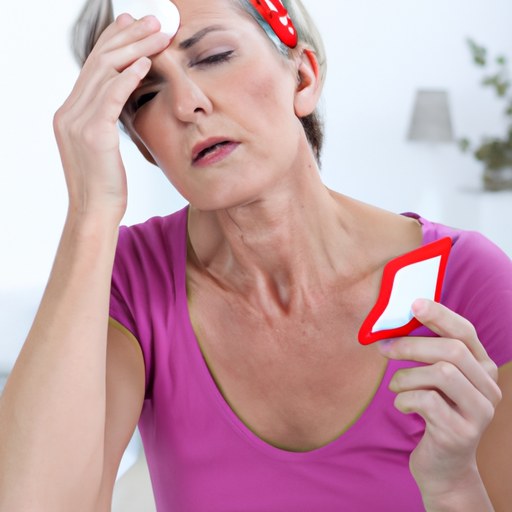Early Signs Of Menopause

Understanding the Early Signs of Menopause
Are you in your 40s or 50s and starting to experience some changes in your body? You may be entering menopause. Menopause is a natural part of aging for women, and it can be a confusing and overwhelming time. It’s important to understand the early signs of menopause so you can be prepared for what’s to come.
One of the most common early signs of menopause is irregular periods. Your periods may become lighter or heavier, or they may become more or less frequent. You may also experience hot flashes, which are sudden feelings of warmth that can last for a few minutes. Night sweats are another common symptom, which are similar to hot flashes but occur at night.
Other early signs of menopause include mood swings, difficulty sleeping, and vaginal dryness. You may also experience changes in your libido, or sex drive. You may find that you’re not as interested in sex as you used to be.
If you’re experiencing any of these symptoms, it’s important to talk to your doctor. They can help you understand what’s happening and provide advice on how to manage your symptoms. There are also treatments available to help ease the transition into menopause.
Menopause can be a difficult time, but it doesn’t have to be. Knowing the early signs of menopause can help you prepare for what’s to come and make the transition a little easier.
How to Manage Hot Flashes and Other Symptoms of Menopause
Are you experiencing hot flashes, night sweats, and other symptoms of menopause? You’re not alone! Menopause is a natural part of life for women, and it can be a difficult transition. But don’t worry – there are ways to manage your symptoms and make the process easier.
First, it’s important to understand what’s happening in your body. Menopause is the time in a woman’s life when her ovaries stop producing eggs and her body stops making the hormones estrogen and progesterone. This can cause a variety of symptoms, including hot flashes, night sweats, mood swings, and more.
Now that you know what’s happening, here are some tips for managing your symptoms:
1. Stay cool. Hot flashes can be uncomfortable and embarrassing, but there are ways to keep them under control. Wear light, breathable clothing and keep your bedroom cool at night. You can also try taking a cool shower or bath before bed.
2. Exercise regularly. Exercise can help reduce hot flashes and night sweats, as well as improve your mood and energy levels. Aim for at least 30 minutes of moderate exercise most days of the week.
3. Eat a healthy diet. Eating a balanced diet can help you manage your symptoms and keep your energy levels up. Focus on eating plenty of fruits, vegetables, whole grains, and lean proteins.
4. Talk to your doctor. If your symptoms are severe or interfering with your daily life, talk to your doctor. They may be able to recommend medications or other treatments to help you manage your symptoms.
Menopause can be a difficult transition, but with the right strategies, you can manage your symptoms and make the process easier. Take care of yourself and don’t be afraid to ask for help if you need it.
The Role of Hormone Replacement Therapy in Treating Menopause Symptoms
Menopause is a natural part of life for women, but it can also bring with it a range of uncomfortable symptoms. Hot flashes, night sweats, mood swings, and vaginal dryness are just a few of the issues that can arise during this time. Fortunately, hormone replacement therapy (HRT) can help to alleviate these symptoms and make the transition to menopause easier.
HRT is a form of treatment that replaces the hormones that the body is no longer producing. It is typically prescribed to women who are experiencing menopausal symptoms, such as hot flashes, night sweats, and vaginal dryness. HRT can also help to reduce the risk of osteoporosis and heart disease, which are common in postmenopausal women.
HRT is not without its risks, however. It can increase the risk of stroke, blood clots, and breast cancer. It is important to discuss the risks and benefits of HRT with your doctor before starting treatment.
For many women, the benefits of HRT outweigh the risks. HRT can help to reduce the severity of menopausal symptoms, such as hot flashes and night sweats. It can also help to reduce the risk of osteoporosis and heart disease.
If you are considering HRT, it is important to talk to your doctor about the risks and benefits. Your doctor can help you decide if HRT is right for you. They can also help you find the right dosage and type of hormone therapy that is best for you.
Menopause can be a difficult time for many women, but HRT can help to make the transition easier. If you are experiencing menopausal symptoms, talk to your doctor about the risks and benefits of HRT. With the right treatment, you can manage your symptoms and enjoy a healthier, happier life.
The Benefits of Exercise and Diet for Managing Menopause Symptoms
Menopause can be a difficult time for many women, but there are ways to manage the symptoms. Exercise and diet can be powerful tools for managing menopause symptoms. Here’s how they can help.
Exercise
Exercise can help reduce the severity of menopause symptoms. Regular physical activity can help reduce hot flashes, night sweats, and mood swings. It can also help improve sleep quality, reduce stress, and boost energy levels.
Exercise can also help you maintain a healthy weight. Weight gain is a common symptom of menopause, and exercise can help you stay at a healthy weight.
Diet
Eating a healthy diet can also help manage menopause symptoms. Eating a balanced diet that includes plenty of fruits, vegetables, and whole grains can help reduce hot flashes and night sweats. Eating foods that are high in fiber can also help reduce bloating and other digestive issues.
Eating a healthy diet can also help you maintain a healthy weight. Eating a diet that is low in fat and high in fiber can help you stay at a healthy weight.
Conclusion
Exercise and diet can be powerful tools for managing menopause symptoms. Regular physical activity can help reduce hot flashes, night sweats, and mood swings. Eating a healthy diet can also help reduce hot flashes and night sweats, as well as help you maintain a healthy weight. If you’re going through menopause, consider adding exercise and a healthy diet to your routine.
Exploring Natural Remedies for Menopause Symptoms
Are you experiencing menopause symptoms like hot flashes, night sweats, and mood swings? You’re not alone! Millions of women around the world are going through the same thing.
While there are many treatments available to help manage menopause symptoms, some women prefer to explore natural remedies. Here are some of the most popular natural remedies for menopause symptoms:
1. Herbal Supplements: Herbal supplements like black cohosh, dong quai, and chasteberry can help reduce hot flashes and night sweats.
2. Exercise: Regular exercise can help reduce stress and improve mood. It can also help reduce hot flashes and night sweats.
3. Diet: Eating a healthy diet can help reduce menopause symptoms. Eating foods rich in phytoestrogens, such as soy, can help reduce hot flashes and night sweats.
4. Acupuncture: Acupuncture can help reduce stress and improve mood. It can also help reduce hot flashes and night sweats.
5. Meditation: Meditation can help reduce stress and improve mood. It can also help reduce hot flashes and night sweats.
These are just a few of the natural remedies for menopause symptoms. If you’re interested in exploring natural remedies for menopause symptoms, talk to your doctor or healthcare provider. They can help you find the best treatment plan for you.





